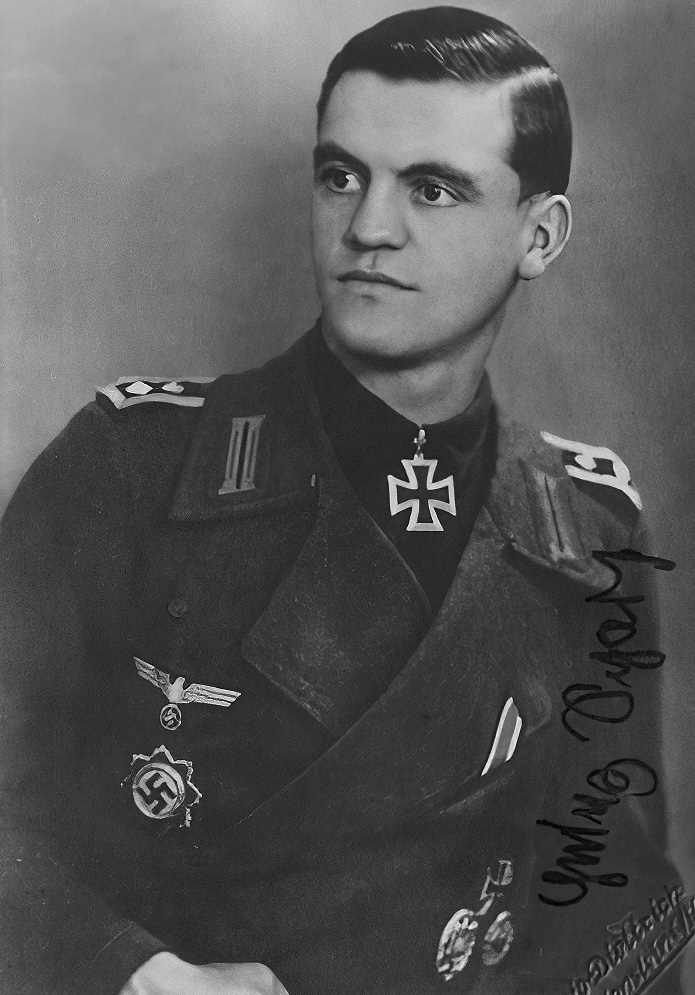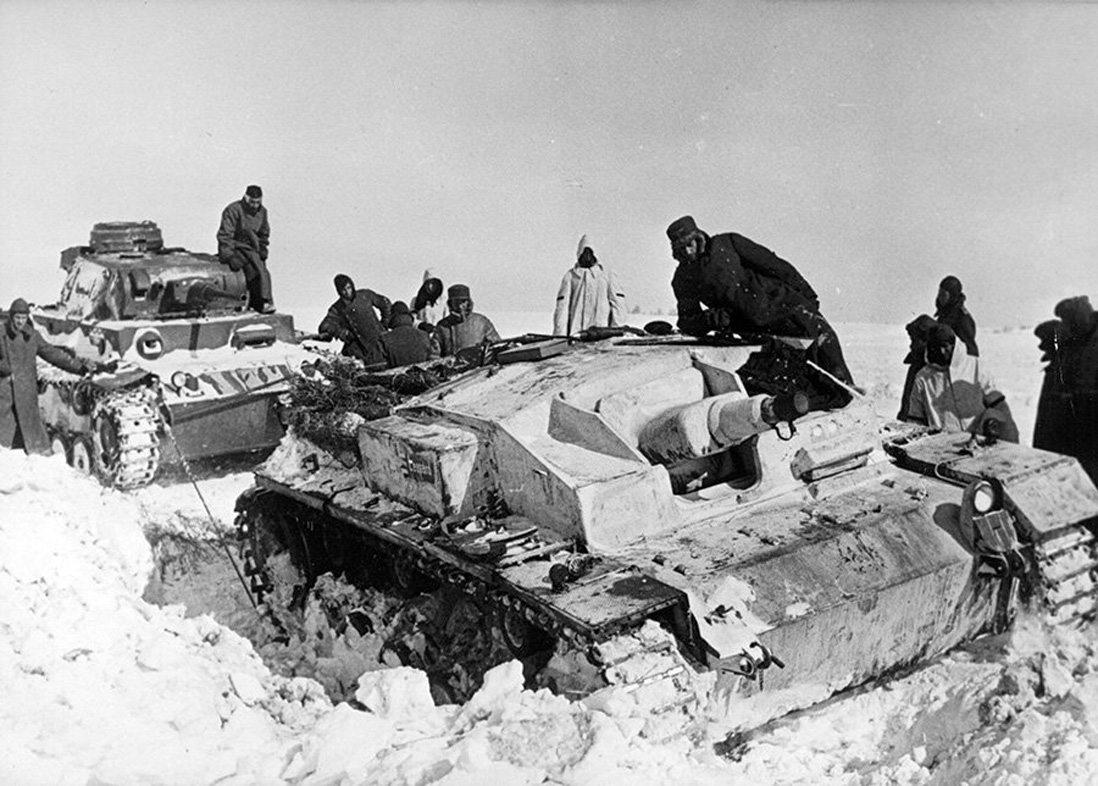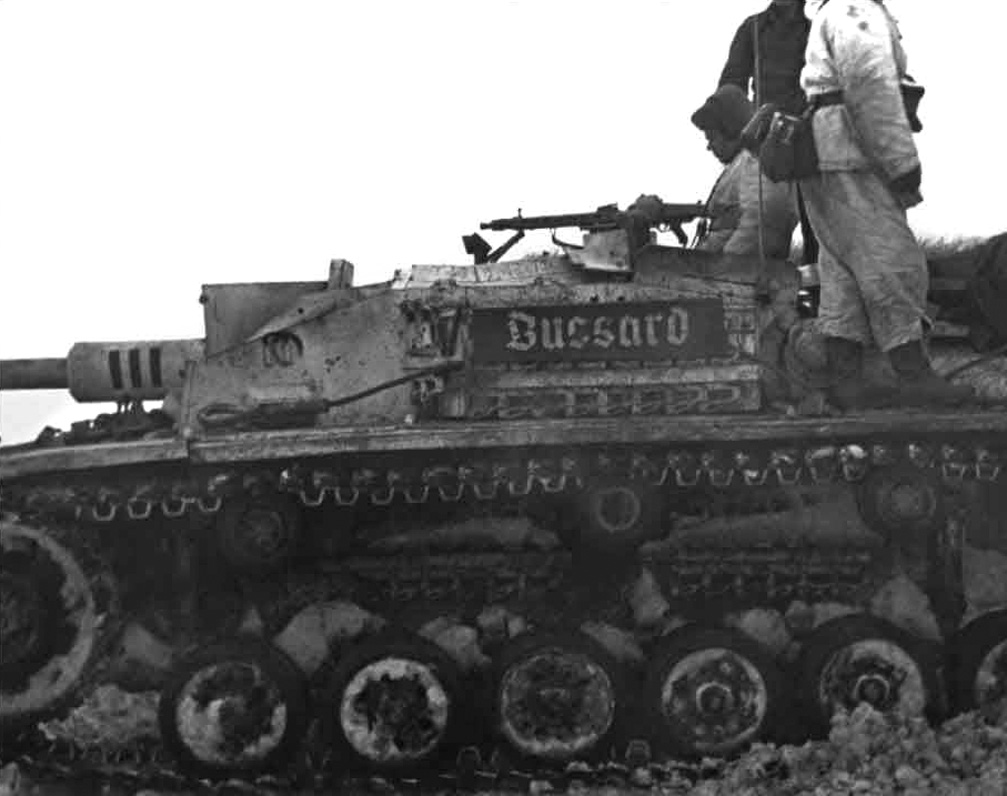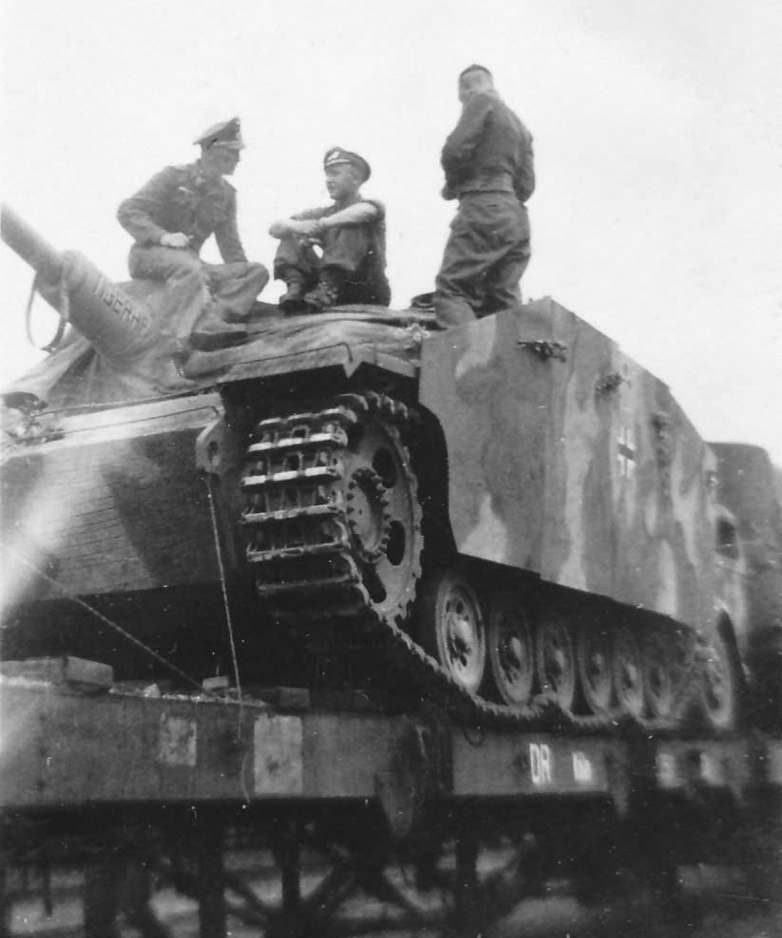

Interview with Heinz Scharf, Knight's Cross winner from Sturmgeschutz-Abteilung 202, the most successful German assault gun unit of the entire war. Scharf himself scored 40+ confirmed tank kills, Zwickau, Germany, 1991.



Interview with Heinz Scharf, Knight's Cross winner from Sturmgeschutz-Abteilung 202, the most successful German assault gun unit of the entire war. Scharf himself scored 40+ confirmed tank kills, Zwickau, Germany, 1991.

Thank you for meeting with me Herr Scharf, it is a pleasure to meet a Knight's Cross winner. Can I start by asking how you feel about German re-unification?
Heinz: Yes my new found friend. It is a good time to be alive and to be a German. Something we have yearned for going on 40 years now has happened. Gone are the Russians and their rule over us by the puppets of Moscow. So there you are, only the most dedicated communists are sad.
Can I ask how the East German government viewed the former soldiers of the Wehrmacht?
Heinz: It was with indifference I would say, much so like the west, as we have discussed. The former soldiers of the Wehrmacht have been shamed since the end of the war. Many have just retreated and dedicated ourselves to living in peace; we have seen enough war and hate.
Did they honor any national days for former soldiers?
Heinz: Oh heavens no, that was only saved for the Soviet dead. Some in the east did secretly honor our fallen on the old heroes' Remembrance Day but it was much frowned on to do so. Only our former enemies could be remembered and honored. Any mention of Soviet crimes like the rape of Berlin was forbidden.
What happened to all the old party faithful and defenders of Hitler in the east?
Heinz: Well if you did not keep your mouth shut or get away I am afraid their fate was not enviable. We heard stories about the Soviets rounding up anyone who was even suspected of party loyalty. They were never seen again. It was quietly said that about a quarter of the East Germans disappeared.
I can say I believe that, and even though many did flee to the west and beyond, many did not get out and were taken away. Whole families disappeared into the abyss, the children were taken to Russia and given to communist families to raise as good Marxists. I know first hand a family here who had a child taken and the mother sent to a camp for hiding a copy of Mein Kampf and other forbidden books.
This story is one of many I am afraid to say. The vengeance that the Russians brought on Germany was severe and some of it is just starting to come out. However whenever someone wants to point out the crimes of the Russians, which are vast, we have people who come out claiming German crimes were far worse.
You can't argue with them I should remind you, it is unlawful even now with the new laws. When a survivor wrote a book about the mass rapes committed by the Russians, not just in Berlin, but all over the east, someone attacker her. They pointed out that the only reason the Russians resorted to these terrible acts was because we did the same thing to them.
This is nonsense and a lie. I see it as blaming the victim for the crime saying they asked for it. I reject that and think it is a childish argument. If it was wrong when German forces supposedly did it, then it is likewise wrong when the Russians do.
People see this too, they just know to keep their mouth shut or they get trouble from the police, media, or communists. I heard all about these crimes after the war, and met people who went through it. My wife lost her best friend who was raped by those animals and then taken away to a camp after she reported it.
There are numerous stories like this, but you never hear of them. But let me rest, I am sorry, you came to talk about the east not my politics. I am sorry.
Oh no, you are fine, I actually like to hear about these experiences and what people recall. What do you think of Honecker and Kohl [East German and West German leaders]; did they do anything to defend Germans from Allied retribution?
Heinz: So Honecker certainly did not, he liked to take credit for working with the Soviets early on to bring the prisoners home after 10 years of mistreatment. He was an old communist who pretended to help the people, yet lived a life of luxury as so many in the party did.
They mocked the Goebbels, Görings, and Leys as being fat cats who fed off the people and enriched themselves, but they did the exact same thing. They thought the people would not notice or see, but they did. There were strikes and riots due to this at times, with many getting shot down or taken away.
Honecker did nothing to help the German people; he was only a servant of Moscow and did their bidding. I do not think you could expect any less, we were a conquered people in both east and west.
Kohl I believe did a little more in regards to reconciliation and understanding. This visit of your president Reagan was a step forward in that regards. There was outrage by the Jews here and those who want to paint the picture of mass German guilt. I was never in the SS and there was always a sense of animosity towards them at the time, but they were good soldiers.
For a sitting American president to lay a wreath in their honor is huge for us, it shows a semblance of respect. I think that's really all any of us former solders have asked for. We did our duty for our nation in a time of war, many not having a choice. For us to be labeled as criminals and scoundrels is wrong.
Kohl was there in the war so he knows what it was like, and I believe I have read that his wife was one of the countless who were raped by the Soviets. He has to be careful in what he says, but I think he knows the truth. There has been more progress in the west regarding the honor of our war service and fallen.

[Above: After years of bitter fighting through six years of war, the German soldier would soon learn there were worse things than the battlefield: Allied occupation. As many Germans said spitefully, 'Enjoy the war, the peace will be hell'. Here we see a StuG III of the Sturmgeschütz-Abteilung 202 getting pulled out of the snow by a Panzer III. Somewhere on the Eastern Front, 1942.]
Since you brought up the topic of crimes, can I ask you about that? It is said that the Wehrmacht and SS, especially in the east, committed vast crimes from rapes, theft, kidnapping, torture, genocide, looting, and arson. Did you see any of this or do you even believe it?
Heinz: Oh boy, that is a lot to go into. We were pumped full of these stories after the war, forced to watch films, and hear oral testimonies. It was a mass physiological endeavor to convince us all we had been on the wrong side, and did very bad things. The problem was, many us lived through the war, and saw it very differently.
I was on the east front; I saw the interactions with the civilian population. I can attest with confidence that I did not see anything like what our former enemies have said happened. When they say for example that German forces were mass raping women in Russia, I can tell you as an honorable soldier, I served in an army that executed any rapists.
Any crime committed against the civilian population, in any occupied nation, was severely dealt with. We had penal battalions where anyone convicted, even of very minor crimes against civilians, was sent. As a matter of fact, there was a man in my platoon, who in 1943 was sent to one for stealing from a peasant family and lying about it to our commander.
We were not perfect, no army is, but we did not commit these crimes they say we did, I know it. I must say to be fair every nation has those few men who use wartime as a way to enrich themselves or exact revenge or hate on people. As I mentioned, there were very severe punishments in the German military for anyone breaking either local, national, or international laws. It was something just not tolerated in our army.
Does that mean that every one had a clean slate, of course not. There was discipline problems we had to deal with, there were looters, liars, and criminals who found their way to us. Every army throughout history has had to deal with these types.
The German Wehrmacht did not take well to having these types in our ranks, and when uncovered they faced judgment, and the penalties were harsh to deter anyone else from breaking the rules. We were a much disciplined bunch who respected the civilians in every nation we went into.
We did not want to be there any more than they wanted us, but we wanted good relations, so that there were no problems. We traded with them, stayed with them, helped them rebuild, and gave them medical care. I was present in Russia when our chief surgeon saved a Russian man who had a burst appendix. These scenes happened pretty often, we never turned any civilian, or even POWs, away from help.
The Russians claim we shot and mistreated their prisoners, but I saw the opposite. I saw our men helping feed the long columns. We would share cigarettes, food, and water when it was practical to do so. We would want them to do that for us, so we did it for them. It's ironic they now claim we did these crimes, yet in reality we did not.
It is my opinion that they have taken isolated instances of reprisals, which happen in all armies, and turned them into something they were not. For example, it was reported that a group of prisoners attacked a guard to try to get away. For this, each guilty party was shot. This would be the case in any army, as it's a crime to assault guards.
I found the Russian soldier could be very sneaky, and in the beginning had to be watched very closely. They would play dead and shoot us in the backs and surrender only to ambush us. They used the white flag many times to try to trick us, so at times soldiers would shoot first and then accept the surrender.
I know also there were times, especially at the time of retreat after Bagration [Operation Bagration was the codename for the 1944 Soviet offensive] that orders were given to destroy towns and any infrastructure they could use against us. This was unfortunate, but Stalin ordered this in the beginning as well, it is a tactic of war that sadly was effective.
The German armed forces spent the first year of the war trying to rebuild what Stalin destroyed, and feeding the millions of civilians. To contrast this with their war crime stories, many of them came over to us as war volunteers because of the nice treatment they were given.
If we did these terrible things from the beginning they would have rushed to fight us, it was not until 1944 when the partisans were able to infiltrate into the rear. They would dress in our uniforms and terrorize the civilians to make them scared of us. I saw this in Poland, where a village was razed by German forces and all the men shot.
It turned out to be partisans who did it because the village was friendly to Germany and had sons fighting as volunteers. This was a tactic they used often. They like to accuse us of shooting civilians down for no reason also. I never saw any of this and I find it hard to believe in a battle that one would waste bullets by shooting civilians just for the fun of it.
They showed us photos of supposed victims of our hate and frustration. I can say that during a battle civilians could get caught in the fighting or perhaps stepped outside and were mistook for the enemy in a split second decision. These things sadly happen, in all armies, but it was not our position to wage war on civilians.
It would be hard on the men to see, it served no military purpose, and it would create enemies we did not need to create. So for that reason I am very skeptical of these stories from former enemies.
I understand, thank you. You won the Knight's Cross as an Assault Gun commander. Can I ask how this happened?
Heinz: Yes, sorry I should change the subject. I was in the Assault Gun Brigade 202 which was quite famous back then. We had many aces in our ranks. The assault gun was a newer weapon that had not seen action before. It was first used as mobile artillery and later on, used against tanks.
I loved this gun, it was slim, easy to hide in an ambush, and could kill most any tank. They really earned their praise by 1944; the enemy had far more tanks than we had. The StuG helped even it out, even if only slightly. I already was awarded both classes of the Iron Cross so was well decorated.
You had to be awarded in steps, the second class first, then first class, then came the German Cross, and then the Knight's Cross. I was presented with the German Cross in Gold for the amount of successful kills our gun had. My crew was very good at hiding and ambushing.
We had many encounters with the Russians where we jumped them and disrupted their attacks. They would send massed units into our thin lines and fire brigades were formed. These were free, mobile units who could move quickly to seal off breakthroughs and so forth.
As for the Knight's Cross, during the massive Bagration operation I was held in reserve after stopping several attacks. A sudden attack broke through in an unexpected area, marked by purple flares indicating tanks present. I was ordered to move to engage the enemy and stumbled into the fight haphazardly.
The unseen attack happened at a weak spot in the line, and they had the aim to capture the area our commander was in. We had a small group that hit the enemy where they did not expect us, and we were able to put many tanks out of action.
One tank after another was hit until we ran out of shells so we retreated to rearm. Returning to the field we took on newly arrived tanks and with the help of infantry we pushed them back to the main battle line they had broken through. They were routed and left with heavy losses.
This was the typical scene for us; we had a small successful action, only to have our flanks in danger forcing us to give back what we fought hard to gain. This was our life in the east in the last years of the war. Local attacks that were successful, but in the end the enemy outflanked us so we had to retreat.
For the action that day and for others I was put up for the Knight's Cross without even knowing it. Like all others we just did our duty to our nation and men. We only wanted to survive and get the men home. Sometimes to do that one had to think quickly and act strategically to win.
It was either defeat those trying to kill you, or it would be the end of us. We trained hard and often so that we could get out of this alive and to stem the massive tide in the east. The kill ratios are very impressive when you look at them on paper, but in the end meant nothing.
The Russians were a massive army whom we could only hope to slow down until decisive action in the west could bring in more reinforcements. This was not to be our fate and in the end we succumbed to the odds.

[Above: StuG III Ausf F/8 of the deadly Sturmgeschütz-Abteilung 202. This machine is named 'Bussard'.]
Can I ask you if you feel Germany could have ever won the war?
Heinz: Oh I do not know. I was just a soldier who obeyed my orders, like so many.
It was not for us to second guess the military decisions, but we still did. There was plenty of griping I can tell you during the retreats. We could see it was due to us being overwhelmed and outnumbered. Who can be blamed for that?
I have a feeling, and it is just me, but Hitler was misled as to the strength of the enemy. Either the generals who were charged with doing the research were dumb asses or they really didn't care what information they provided. I heard Hitler give a speech in which he acknowledged that wrong data was used and it caused him to not commit everything he should have. He took the blame.
That was odd for me to hear, but it made sense as to why we were in the situation we were. So I don't know. If you are asking how we could have won, I would say it was over when America came in. If we could have kept you out [interviewer is American], and took the oil fields first instead of driving on Moscow, we would have had a chance.
One thing never mentioned is that we were always short of supplies. Our supply corps did not do well. We would have to wait long periods for parts, fuel, and ammunition. We did the best we could, and here is why we never wanted to make civilians angry at us. We had to rely on them for food and shelter.
Yes, it is not well known but in the east, especially in winter, we had to stay with families in their homes. They would feed us and care for us. In turn we supplied firewood, labor, and protection. We would hide our guns under cover and huddle together to stay warm. It made for some awkward sleeping arrangements at times but we made it work.
We could go days without deliveries of supplies, so the civilians really helped us in those times. We would help the man of the house fix up things, while the women cooked hearty meals. If we would not have had supply issues, I believe we would have moved faster and more effectively.
There were times the Russians easily broke through our battle lines due to units having very little ammunition, no heavy weapons and few able-bodied soldiers. It was very common for one platoon to be defending a large area that a brigade could come through. That is why there was the fire brigade idea.
Also if the Luftwaffe would have had more fighters, the bombings would not have been as bad. You see there are many ifs to this. If only we took the British at Dunkirk, if only Rommel had more troops, if only we started Barbarossa in April, and so on. So many things would have needed to go right.
We did not have that fortune, and the numbers were too much to overcome. We were one small nation who took on the might of the world. It was a true David vs. Goliath fight but this time we would not be lucky to strike that death blow.

[Above: A StuG 40 Ausf G named 'Tigerhai' of the Sturmgeschütz-Abteilung 202, 1944.]